The story I am going to share with you today is different from all other stories I have written & published on this world travel blog of mine. It is a story straight from the heart of one of my dearest friends in this world, Rakesh Shahi from Nepal, written at a moment in time that could not have been more difficult nor challenging, neither for him nor for his country: “On April 25, 2015, just another Saturday morning, a day off for almost all Nepalese people, I was resting in my bed when all of sudden everything started shaking. I remember thinking, ‘This is just another minor earthquake’, but then it would not stop shaking, but continue with more and more intensity. My room and our whole house were dancing, and all I did & kept thinking during that time was, ‘THIS IS A DREAM, IT CANNOT HAPPEN’.”
I have met Rakesh Shahi, of Mystik Mountains Adventures & Holidays, in the wake of my #CreativElenaRTW research trip in Nepal, fascinated by this country’s tremendous sense of hospitality & human kindness. This time, I pass the word on to him, asking how he became involved in post-quake Nepal relief efforts & sharing his most inspirational story for the benefit of all of us to learn and take inspiration from.

My dear friend Rakesh & I meeting in Nepal: Lovely seeing the real faces to a country that has conquered my heart (and stomach) in many ways.!
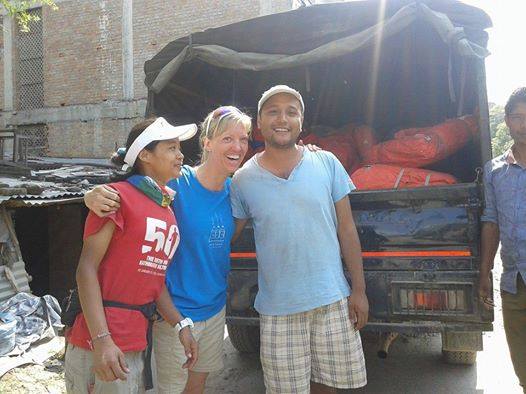
… and only a little later out with other volunteers in rural Nepal, sharing & distributing relief supplies to areas affected by the devastating earthquake.
Dear Rakesh, to start with, please tell us this: What happened in the first few days after the devastating earthquake measuring 7.8 on the Richter scale struck Nepal? What was your immediate reaction, and how did your friends & family live through the experience?
When the shaking in my home district of Kathmandu had finally stopped, all I could think of was my dad & aunt who lived one floor below me, in our three-storeyed house that luckily still remained standing. I then rushed down and carried my dad out into the safe open space, himself unable to walk after suffering from a stroke. Every five minutes, the Earth kept trembling with more huge tremors. I noticed people crying around me, especially the elderly breaking out into a traditional god’s chant, praying for relief. Phone lines as well as the Internet went down. Luckily, the neighborhood I live in did not see much damage nor casualties. Nobody around me had ever been a part of such disaster. We were afraid and nervous beyond imagination. During the three days that followed the first big quake, we stayed outside in the open field for safety reasons, relying on tarpaulin tents for shelter and basic dry food. Every now and then, news of more casualties and damaged houses in nearby areas kept coming in and brought our spirits down.
Just outside of our neighbourhood, I could see broken buildings, ambulance on the road, rescue airplanes & choppers flying, and every time could feel my heart crying in disbelief: ‘GOD, this could not happen, we do not deserve this one.’
So after the shock of the first few days had passed and there were only minor tremors left, a friend of mine called (the phone lines were by this time working again), asking if I could go out with him and some more friends in order to deliver medicine & supplies to one of the most affected areas near Kathmandu – Sankhu village. When we reached there, the old town was completely wiped out. I saw the look on people’s faces who had lost everything – houses, family members, supplies, virtually everything.
All I kept thinking was: ‘Rakesh, you are really lucky to be alive without any major damage to your life, your possessions, and so on. Now is not the time to live a life for yourself, but rather to help those people whose lives have been completely destroyed by the earthquake. If people like you and your friends do not take necessary relief action, then who will?’
All our friends had the same thought. All of us wanted to contribute unselfishly, and immediately. There was a gathering momentum among us. Friends from abroad reached out to us. Initially, our aim was just to provide relief supplies to one location. But then, more and more people kept joining in and contributing. Within just one day, we were ready to disperse two trucks including 1500 kg of tarpaulin tents as well as food & medical supplies to some of the most affected rural areas called Nuwakot and Dhading. Some friends took over the responsibility of collecting the funds while others gathered the supplies. Most importantly though, our recently formed group of friends and volunteers made sure that those very relief efforts we are talking about here reached the most needed and affected communities of rural Nepal.
We felt that the people of Nepal needed young, unselfish people like us to help rebuild our country. Then we gave ourselves a name: ‘Immediate Earthquake Relief for Rural Nepal’, gathering support & coordinating news updates as a Facebook page. All of us had different backgrounds & professions, coming together for a noble cause and giving our time & efforts working almost 18 hours a day.
During this time, I remember being ever so thankful to all the friends and supporters in Nepal as well as abroad, who had supported us with funds, resources, sometimes just words of support. Every effort we felt mattered. Without it, it simply would not have been possible. This was not about individuals, nor about being a formal organization: The best way I can describe it is that all of our helping hands kept coming together as a team when needed most.
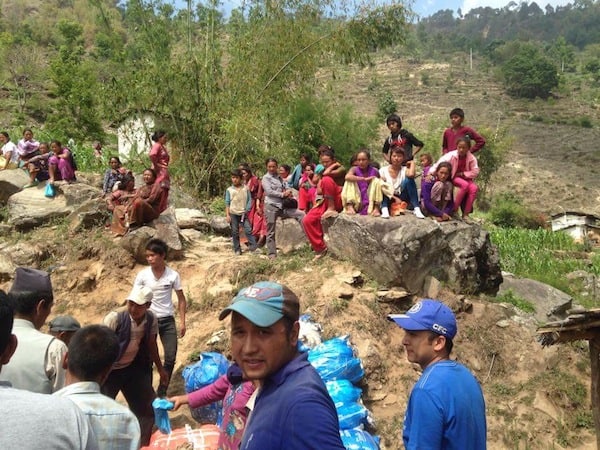
Going out to help: People eagerly waiting for distribution of our immediate relief supplies. © Rakesh Shahi

Our team has also distributed some solar light and mobile chargers: This helped people to stay in contact and keep up the communication during the disaster as the main line electricity had been destroyed. © Rakesh Shahi

… and unfortunately, this soon turned into a common sight for us: Houses & entire villages being down in rural Nepal. © Rakesh Shahi
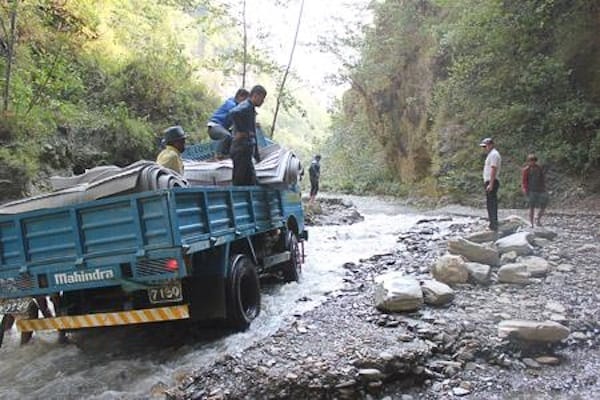
Reaching out to some of the most remote and inaccessible locations means that sometimes here in rural Nepal, the river is the road. © Rakesh Shahi

All people waiting for our supplies to be distributed. What struck and impressed me at the same time was that even in these situations, you could still see calmness, patience and discipline on behalf of the people waiting. Amazing. © Rakesh Shahi
So how is your volunteer group of young people organized? What kind of tools, methods of communication, organizational structures & decision-making processes are you using to effectively deliver aid supplies?
Our volunteer groups are basically friends and friends of friends that have come together from different walks of life in order to give their best efforts to the community of all Nepalese people. We have a meeting point where we collect supplies and later on disperse them to communities that need them most. These are still early days and we do not have an organizational structure yet, as we are working on immediate relief only: The best we can do is to act fast and gather the relief materials heading out to the communities. Up until now, we have already provided 4000 tents and 20 trucks full of relief supplies (food & medicine) to people in need.
We believe that right now is the time for action as even minutes make a life-saving difference to people and their communities. For now, it really is all about taking quick, effective actions.
How are you funded? How do you access supplies and aid materials for delivery to communities? How will you further use the funds raised through GoFundMe?
So far, all of our funds have been raised by ourselves and our group of friends and friends of friends that specifically showed a desire to help and be part of our cause, for instance through this GoFundMe campaign. The majority of our relief work has been based on immediate needs such as shelter, food and supplies. Thanks to what we have been able to raise and our good connections as a team, we have been able to order at better prices, e.g. from nearby places in India. As far as the delivery is concerned, we always made sure it reaches people in the community directly by having at least five volunteers go and deliver the supplies we gathered.
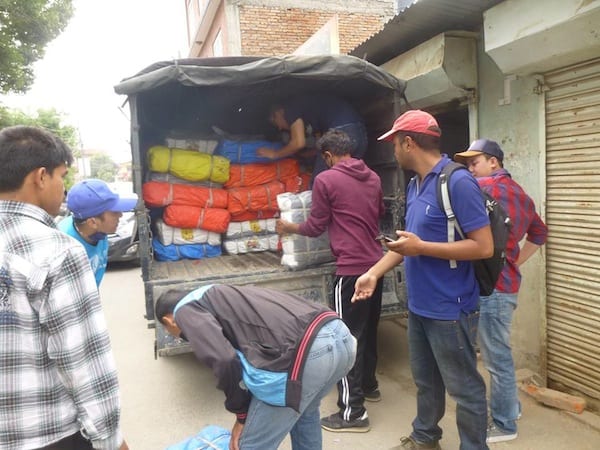
Ready to head out to Sindhuplachowk, one of the most affected area, with our truck load full of shelter tarpaulin tents. © Rakesh Shahi
What is your observation of the immediate relief work done by professional organizations (government, NGOs, international aid organizations, etc.)?
To be very honest, I am actually quite disappointed with the work of professional organizations during the immediate relief plan. With all this massive destruction, loss of lives as well as the hardship of those living through the big earthquake’s aftermath, there has been, and still is, above all a need of immediate response. But all these organizations have since started making mostly action plans, meetings and so on when people were literally crying in the streets, asking us for help. In contrast, I believe that the army and police forces did very well in rescue work. As far as providing immediate supplies to people who needed them the most, however, I believe professional organizations did actually fail badly. I know there needs to be proper planning and management plans for re-building and rehabilitation work, but right now, I believe, all that is needed is time to act, and not think (so much).
What is your single most inspiring encounter that you have experienced in providing relief to communities in rural Nepal?
The most inspiring thing I encounter are the people who still face reality with a smile on their faces despite their houses being down, despite the losses of lives and belongings around them.
Whenever I travel through the villages affected by the devastating earthquake, what has really touched me was that the people there were still showing to us that it will come right again. And this relates to all Nepali ways of thinking, our very own attitude and mindset helping us to get through the wake of this disaster.
Also, in rural villages I believe, life has always been hard and those people have learned to live with it. Watching and understanding this situation really inspired me to a point where, if these people can still show smiles despite all the tragedies, why not us who have basically not lost a single thing, such as our lives, possessions, friends and family members?
What has shocked you the most? And why?
It is not the earthquake, nor the fear, but the aftermath of life in the affected areas that has shocked me beyond imagination. Some places have been known to have been wiped out completely. In my mind, I have this terrifying scenario of going there one day, thinking will I ever get to see the same people & places again, and how will they cope getting back up to normal? This is a thought that still hurts every time it passes through my mind and heart.
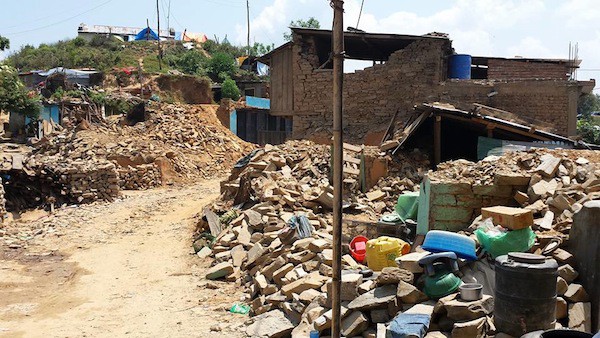
Let us hope and pray that we will still see some of the same places and people as before … © Rakesh Shahi
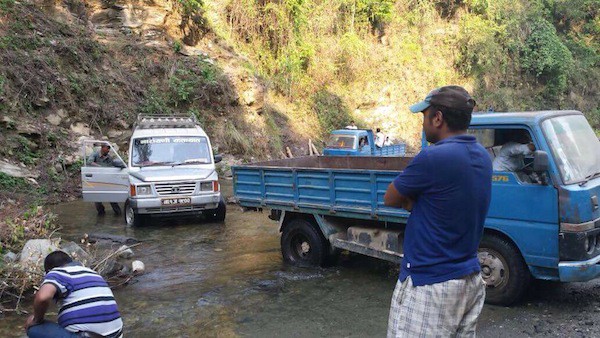
Never giving up hope to “pass” is one of the single biggest mental (and physical) challenges we faced on the road delivering supplies. © Rakesh Shahi
How do you personally cope with the psychological strain of “life & death”, of sleeping outside on the countryside, of providing help still knowing that so much remains to be done?
Despite all our everyday psychological constraints of passion pursuit and wealth accumulation, there is so much more in life that is and always will be, beyond our control. Personally, I tend to think that nowadays, anything can happen any time. It is heartbreaking, for sure, at the same time seeing so many people in need of help. The best thing to do is to give our best efforts to help: Every effort matters. Every little step counts.

Our volunteers, loading the truck with supplies and ready to go out into the next affected area. © Rakesh Shahi
How has the earthquake changed your home city, Kathmandu? What griefs you most? Where do you see the greatest hope for the future despite the ruins?
Kathmandu unfortunately has been affected greatly in terms of both human casualties, heritage as well as property loss. For a city with such a rich history, knowing that the historical Kathmandu Durbar Square and Sundhara districts have come down makes me feel truly heartbroken. It will take a long time to heal, as Kathmandu appears to have lost valuable parts of its body and is now handicapped beyond imagination.
Despite the ruins, Nepal, and especially Kathmandu, has come together as a people.
This natural catastrophe made us feel that we all needed to work together so as to build a better tomorrow. I could see even the people and offices which I least expected coming out with passion to work together for better future. It has given us a sense of unity among people. Nepal will certainly move in the right direction of peace, prosperity and development sooner rather than later: This is what I can truly say after seeing the spirit of the Nepali people in action after the devastating earthquake hit us earlier this year.
And finally: What is your individual outlook on life “post-quake”? In how far has it changed your perception, both in terms of running your own travel business as well as for you personally?
The earthquake as well as the ensuing relief work I have been involved in have taught me many a lifelong lesson, outlook and perspective. I can already say that I feel more motivated, inspired and happy to work for a better tomorrow, no matter how small or big it might be. Tourism, a key economic factor to the growth of Nepal as a country, has also been affected greatly. We have lost countless historical monuments, trails & tourism infrastructure. Fear from travellers has resulted in cancellations or postponement of trips to Nepal, including reservations made through my own company, Mystik Mountains Adventure and Holidays.
A lot of people who rely on tourism to make an income, especially ground support staff such as cooks, guides, porters, hotel staff etc. will have a tough time moving ahead. There will be severe short-term effects and we will have to find a way to sustain ourselves and our country during those times.
Personally, and I say this full of hope, confidence and trust: I still believe Nepal has a beautiful future ahead, what with so much left to discover, travel and explore in this beautiful part of the world. Despite all the media circulation concerning travel in Nepal, most of the places are still safe to travel.
Out of 75 districts of Nepal, only eight have been affected by the earthquake. Out of 10 national parks, only one has been affected. Out of eight UNESCO World Heritage Sites, only two have had around 40% damages. 90% hotels in Kathmandu valley are safe and operating. All highways are free and open, too. 100% of hotels in popular destinations such as Pokhara, Chitwan, Lumbini, Bardiya, Far West Region, Annapurna Region, Everest Region etc. are safe and in full operation. Out of 35 popular trekking routes, only two have been affected. All the international and national airports are in operation with no damage at all. Communication (phone lines, ATMs, Internet) is working well. Hospitals and clinics are safe and in operation. No viral diseases or influenza outbreak have been reported.
In this way still, the best way you can help to rebuild Nepal is by travelling here and contributing directly to the local economy. We, the Nepali people, are here to welcome you in the warmest way possibly, adhering to our motto of “guests being like Gods” and helping affected communities to get back on their feet when really they need it most.

… and especially YOU, our ever so dedicated team of volunteers, to help out those who rely on our efforts for saving their lives – and hopes for a better tomorrow. © Rakesh Shahi
Thank you so much, dear Rakesh, for taking the time to complete this interview, on behalf of you and all Nepali people around you. We have so much to learn from you: It is truly inspiring. Keep going in this way and #StayStrongNepal !!!
For more information & in order to stay up to date, please follow the news updates & relief support published through the Facebook page “Immediate Earthquake Relief for Rural Nepal“.
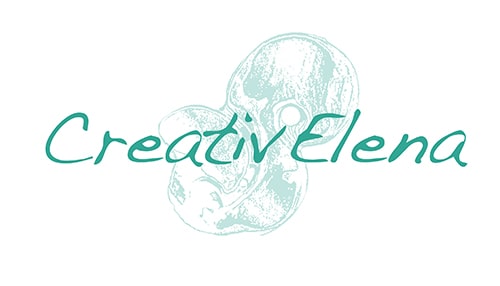

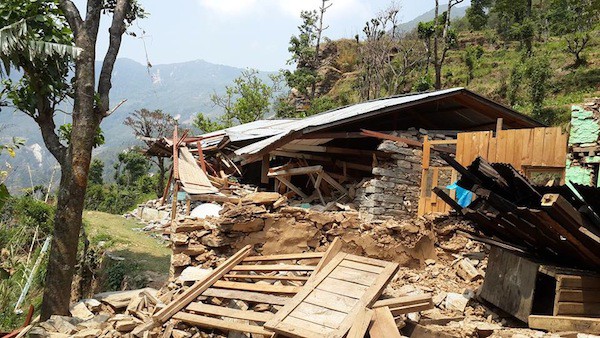
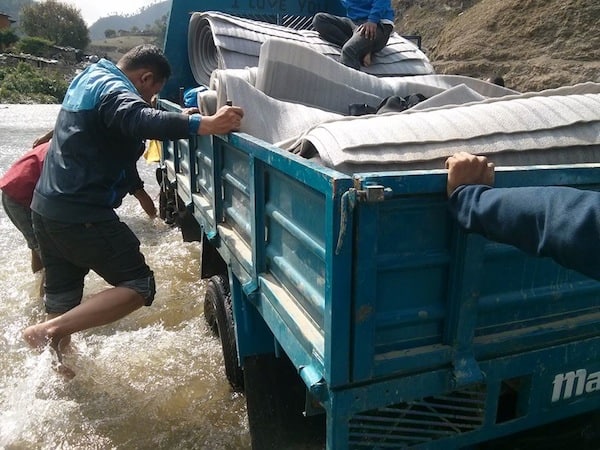
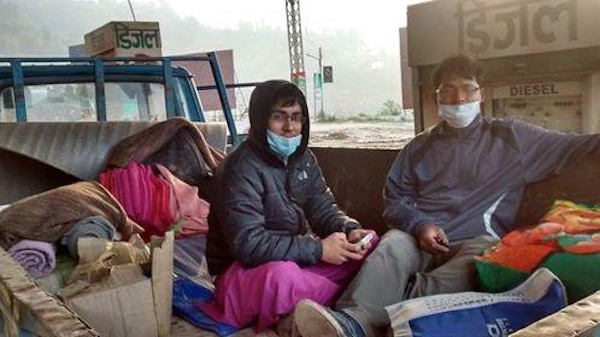


3 comments
Reading through this shakes me and brings back clarity… it’s been 16 years since I was there, and time sadly has a way of dulling the memories. My thoughts and sorrow have been with the people of Nepal ever since the tragic quakes and I long to come back to try and help in some small way if I possibly can.
I’d just like to thank you Elena, and all the wonderful people you have shown here for the wonderful work they are doing. Namaskar to you all, and dhanyabaad for your wonderful efforts. It is really inspiring to see you working quickly to help those who need help fast.
My love and best wishes to you all, Michael. (Melbourne, Australia)
Dear Michael,
Thank you so much for your thoughtful and supportive comment here, much appreciated by the people of Nepal as well as myself. Like yourself, I have a strong connection to this precious country, and continue to care deeply about the friends and families I met there. This, I thought, was the least I could do, lending my public voice as “Creativelena” to the people of Nepal in dire times like these.
Kudos to Rakesh Shahi and his team of wonderful, hard-working friends & family, for keeping up the spirit and moving forward.
Best wishes back to you, and hopefully you’ll get a chance to travel there soon again!
Elena
Hi Michael ,
Namaste !!!
We are glad to hear from you and happy to know you like this country and people . Thank you for your kind words and providing us the reason to continue good work that this country and people need after tragic earthquake of last year .
Hope to see you soon in Nepal someday .
Dhanyabad !!!
Rakesh